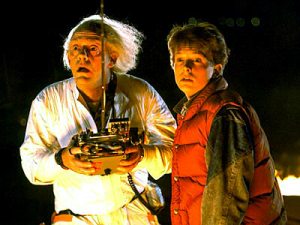
Today is November 5th, which, according to Back to the Future, is a red-letter date in the space-time continuum (it's the day Doc invents time travel). So, I figure it's a great day to reflect on what Back to the Future held for the future.
Back in the mid-80's, a wonderful trilogy of movies was filmed, which is still my favorite set to this day: Back to the Future. There are many aspects of these films that set them firmly on a preferential pedestal. The casting couldn't have been better.
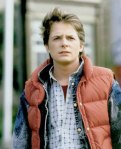
Michael J. Fox plays the part of Martin (Marty) McFly, a cool, socially-savy, slightly insecure 17 year old who knows a lot about love, but can't stand it when people call him "yellow," and learns a lot throughout the trilogy about not allowing others' opinions to dictate his life. He (somehow) befriends an old, crazy-eyed scientist, Doctor Emmett L. Brown. Their association is never explained. How does a high school student become involved in the experiments of a fringe-scientist? I'm not sure, but I love the combination. Doctor Brown,
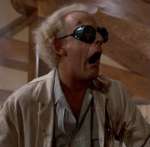
or "Doc," is played enjoyably by Christopher Lloyd. He's the perfect picture of a mad scientist. He offers the trilogy all the techno-babble to explain just how time travel is possible. Together Doc and Marty discover the advantages and serious consequences of time travel, as they go from their native 1985 back to 1955, forward to 2015, way back to 1885, and finally home again.
Their travels to 2015 are of interest. When all the problems of the first movie have been resolved, Marty asks Doc where he'll go now. He tells him he'd like to go to the future "to see the progress of mankind." He says he'll go ahead "30 years. It's a nice round number." When Marty goes to the future in Back to the Future II, we get to see this progress.
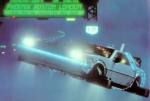
To name a few of the 'advancements,' there are flying cars which travel"skyways" rather than highways, hoverboards, a controlled weather system, an efficient justice system (which has done away with lawyers), robotic waiters, automated gas stations, holographic advertising signs, video conferencing in place of the phone,
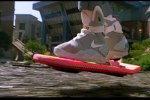
lots of fax machines, vocal recognition, voice-activated lighting, retinal scan identification, self-drying (and automatic fitting) clothing, power-lace shoes, and hydratable foods.

Also, the clothing fashion has become very bright, shiny, colorful, and all the young people wear their pockets inside out. (That's a young Elijah Wood to the left.)
So, are we there yet? We definitely haven't discovered an easy way to make cars fly, or to make skateboards hover. The weather is still as unpredictable as it ever has been. Though some parts of life have become more automated, such as self-serve banking and grocery shopping, or pay-at-the-pump gas stations, we are not yet served by robots. Our clothing is still very non-futuristic compared to that of Back to the Future's 2015. No self-drying, auto-sizing, or power lacing. Retinal scanning might happen in the most advanced corporations, but for now, it remains mostly in the movies. Our justice system is still not very efficient, and still full of lawyers. We do have many fast-convenience food items, though not quite like the hydrated pizza that starts the size of a quarter, and when hydrated, can feed a family of five.
On the other side of things, we've moved beyond the fax machine for the most part. Back to the Future's 2015 saw the fax machine as part of the communication of the future, with Marty's notice of job termination spitting out of almost 10 fax machines around the house. We do have such things as voice activated services, like lighting.

Video calls are becoming more common, especially with the use of webcams. One thing the trilogy's writers did not anticipate that we do have in 2009 is the internet. The internet, as we know it now, did not exist in 1985, and is very much one of the great driving forces of our technology and convenience in this day and age.
Overall, though, we still have a lot of ground to make up if we are to achieve the vision Back to the Future has set out for 2015. We have six years to go.








